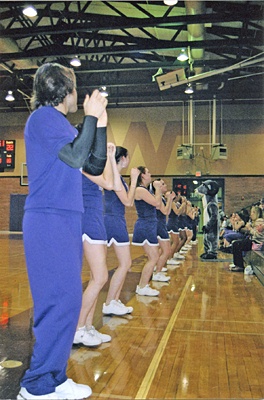All Nonfiction
- Bullying
- Books
- Academic
- Author Interviews
- Celebrity interviews
- College Articles
- College Essays
- Educator of the Year
- Heroes
- Interviews
- Memoir
- Personal Experience
- Sports
- Travel & Culture
All Opinions
- Bullying
- Current Events / Politics
- Discrimination
- Drugs / Alcohol / Smoking
- Entertainment / Celebrities
- Environment
- Love / Relationships
- Movies / Music / TV
- Pop Culture / Trends
- School / College
- Social Issues / Civics
- Spirituality / Religion
- Sports / Hobbies
All Hot Topics
- Bullying
- Community Service
- Environment
- Health
- Letters to the Editor
- Pride & Prejudice
- What Matters
- Back
Summer Guide
- Program Links
- Program Reviews
- Back
College Guide
- College Links
- College Reviews
- College Essays
- College Articles
- Back
Cheerleading: Should It Become A Sport?
One of the most controversial topics in sports today is the question “Is cheerleading a sport”? Many people believe that it shouldn’t be recognized as a sport, but it definitely should. Competitive cheerleading should be recognized as a sport because it fits in the definition of a sport, requires athleticism, physical fitness, is branching out, and should not be discriminated against.
First, Competitive cheerleading should be recognized as a sport because it fits the definition of a sport. Dictionary.com defines a sport as “An athletic activity requiring skill or physical prowess and often of a competitive nature”. While sideline cheer may not fit this definition competitive cheer certainly does. These athletes practice year-round to compete against other teams across the country or even the world and try and win. Collegiate and competitive teams have competitions to beat other teams that come from across the world to show their routines off. The winners of these competitions often get medals, trophies, jackets, rings, etc. Cheerleading fits the definition of a sport, therefore it should be classified as one.
Cheerleading should become a sport because it takes skill, fitness, and hard work. Katie Thomas writes, “Why should cheerleading not be considered a sport when it required a complex set of technical skills, physical fitness, and real guts?” (the New York Times). Most people would not be able to tumble, hold up other girls and boys in the air, and try and make it look easy for the judges. Competitive and collegiate cheerleaders have to train multiple days a week and some even have practices 5 days a week. Cheerleading is much harder than it looks and should be recognized as a sport for this reason.
Cheerleading should be given the title of a sport because it is branching out into new and different things. USA cheer, an organization that organizes and governs cheerleading activities around the United States has started a new women’s only sport called STUNT that meets all of the Title IX sport requirements. STUNT “removes the crowd-leading element and focuses on the technical and athletic components of cheer”(Cheer Shows Competitive Cheerleading Is Almost as Dangerous as Football. So Why Isn't It Officially Considered a Sport?). STUNT is branching out the cheerleading world and allowing it to be taken more seriously and should be able to earn the title of “sport” in the next 10 years. Cheerleading is not just cheering on the boys anymore and now focuses on the requirements and “sports side” of cheerleading.
Others would argue that cheerleading is just girls wearing tight-fitting outfits, cheering on the boys, or even that by calling it a sport, other sports like women’s soccer and softball were being degraded. While sideline cheer is not very sports-like, competitive cheerleading is quite the opposite. It focuses on the important aspects of cheerleading like tumbling, stunting, dancing, and jumps. Other sports should not feel degraded that cheerleading is a sport because it takes hard work and dedication just like other sports.
In conclusion, competitive cheerleading should be recognized as a sport because it fits in the definition of a sport, requires athleticism, physical fitness, and is creating a new name for itself. Practices and competitions that are held year-round to compete against other teams show how hard cheerleaders work for their sport. In a New York Times article, Katie Thomas writes, “Why should cheerleading not be considered a sport when it required a complex set of technical skills, physical fitness, and real guts”? With the creation of STUNT, cheerleading has taken on a whole new name and it should not be attached to its stigma anymore. Should people think cheerleading is just girls in tight-fitting outfits cheering on the boys anymore? Try going to a cheer competition and find out what it is really like!

Similar Articles
JOIN THE DISCUSSION
This article has 0 comments.
